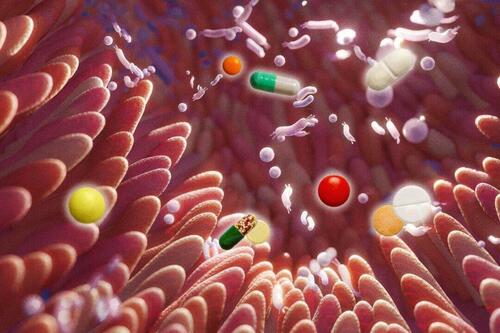Authored by George Citroner via The Epoch Times (emphasis ours),
While patients have long known that antibiotics can disrupt gut health, researchers have now discovered that seemingly harmless medications—including common allergy pills, antidepressants, and hormone treatments—may also pose a threat to the protective bacteria that keep dangerous pathogens at bay.

“This can be dangerous to frail or elderly people,” senior study author Lisa Maier, said in a press statement.
Scale of Problem ‘Utterly Unexpected’
The study, recently published in Nature, found that 28 percent of 53 tested nonantibiotic medications promoted the growth of harmful pathogens like Salmonella in laboratory models, potentially leaving millions of patients vulnerable to serious intestinal infections.
“The scale of it was utterly unexpected,“ said Maier. ”Many of these non-antibiotics inhibit useful gut bacteria, while pathogenic microbes such as Salmonella Typhimurium are impervious,” she noted. “This gives rise to an imbalance in the microbiome, which gives an advantage to the pathogens.”
While researchers didn’t specify all medications tested, they highlighted concerning findings about widely prescribed drugs, including clomiphene (a fertility drug), simvastatin (a statin), floxuridine (a chemotherapy drug), and an allergy medicine—all increased infection risk. The antihistamine terfenadine was highlighted by researchers as one nonantibiotic found to weaken natural resistance to infection, leading to faster disease development and heightened inflammation from Salmonella in mice.
Very commonly prescribed antacids, such as Pepcid and Prilosec, are also prone to increase a person’s susceptibility to gut infections, noted Dr. David Purow, a gastroenterologist and the eastern regional director for gastrointestinal endoscopy at Northwell Health, who was not involved in the study. He said this is because reduced stomach acid can encourage an environment that allows harmful bacteria to survive and thrive.
Beneficial versus Harmful Bacteria
Researchers found that pathogenic bacteria like Shigella flexneri and Escherichia coli—which are responsible for illnesses such as typhoid fever, diarrhea, and urinary tract infections—were more resistant to some drugs than were the beneficial gut bacteria. The team theorized that these drugs may increase the growth of pathogens by inhibiting or disrupting the beneficial microbes.
For example, drugs including simvastatin, floxuridine, and the antipsychotic chlorpromazine increased the growth of Shigella flexneri and Escherichia coli at certain concentrations. Zafirlukast, an asthma drug, stood out from most of the drugs studied, as it inhibited the growth of Shigella flexneri but promoted the growth of Escherichia coli.
“While the necessity of drugs is unnegotiable, even drugs with supposedly few side-effects can, so to speak, cause the microbial firewall in the intestine to collapse,” Maier said.
This study adds to previous research, also published in Nature, that reported 24 percent of the nonantibiotic drugs, including antivirals, antipsychotics, acid-reducing medications, chemotherapy drugs, and blood-pressure medications, inhibited the growth of at least one strain of gut bacteria commonly found in healthy people.
Certain drugs may interfere with the normal interactions among bacteria, either by blocking nutrient access for harmful germs or by disrupting the beneficial bacteria’s ability to keep pathogens in check.
The findings indicate that some nonantibiotic medications may impair the gut’s defense mechanisms, making people more susceptible to intestinal infections—especially among certain patient groups.
“Older adults, individuals with chronic inflammatory conditions, immunocompromised patients, and those with a history of recurrent antibiotic use already have less microbial diversity, which makes them more susceptible to further disruption,” said Dr. Ruvini Wijetilaka, a board-certified internal medicine physician at Mecca Health, who was not involved in the study.
Probiotic Treatment May Help
Experts emphasize that patients should not stop taking necessary medications. There are “targeted therapies” that could help restore microbiome health, Purow noted.
“Whether you do prebiotics or probiotics, [they] have the potential to help,” he said, though he cautioned that optimal treatments may vary between people since healthy gut bacteria ratios differ from person to person.
Researchers pointed out that the study had several limitations. It was conducted using laboratory-based experiments outside of a living human body, which may not fully capture the complexity of the human gut environment. Additionally, the specific drugs tested and bacterial communities used in the study may not represent the full diversity found in real-world settings.
“Animal and in vitro studies are invaluable for identifying potential mechanisms, but the translation to humans is complex,” Wijetilaka said. “The human microbiome is far more diverse and variable than that of lab animals, and it’s influenced by numerous lifestyle and environmental factors.”
Loading recommendations…


